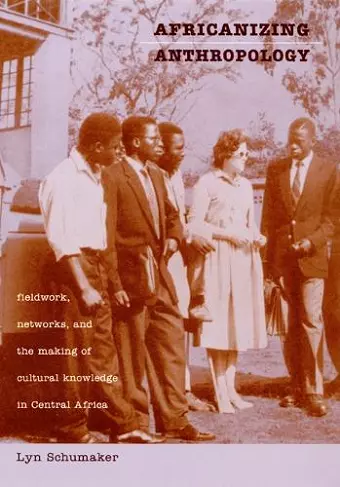Africanizing Anthropology
Fieldwork, Networks, and the Making of Cultural Knowledge in Central Africa
Format:Paperback
Publisher:Duke University Press
Published:12th Jul '01
Should be back in stock very soon

An innovative cultural study of a major site of British anthropology
Tells the story of anthropological fieldwork centred at Rhodes-Livingstone Institute in Northern Rhodesia during mid-twentieth century. Focusing on collaborative processes rather than on the activity of individual researchers, this book places anthropologists' assistants and informants in a central role in the making of anthropological knowledge.Africanizing Anthropology tells the story of the anthropological fieldwork centered at the Rhodes-Livingstone Institute in Northern Rhodesia (now Zambia) during the mid-twentieth century. Focusing on collaborative processes rather than on the activity of individual researchers, Lyn Schumaker gives the assistants and informants of anthropologists a central role in the making of anthropological knowledge.
Schumaker shows how local conditions and local ideas about culture and history, as well as previous experience of outsiders’ interest, shape local people’s responses to anthropological fieldwork and help them, in turn, to influence the construction of knowledge about their societies and lives. Bringing to the fore a wide range of actors-missionaries, administrators, settlers, the families of anthropologists-Schumaker emphasizes the daily practices of researchers, demonstrating how these are as centrally implicated in the making of anthropological knowlege as the discipline’s methods. Selecting a prominent group of anthropologists-The Manchester School-she reveals how they achieved the advances in theory and method that made them famous in the 1950s and 1960s.
This book makes important contributions to anthropology, African history, and the history of science.
“Schumaker’s work, which takes a completely different approach to the study of anthropology, is by far the most revealing account I have ever read, not only of the Rhodes-Livingstone Institute but of anthropology in Africa. Both highly innovative and extremely convincing, it sets new standards for Southern African intellectual history.”-Terence Ranger, University of Zimbabwe “This is one of those rare books that is capable of shaping basic understandings among several disparate audiences at the same time-among anthropologists, for whom it will be a revelation about the role of research assistants in shaping the discipline, among historians of science, who will gain important new insights about colonialism and the field sciences, and among historians, who will see anthropology and history in a new light. Schumaker addresses familiar issues concerning anthropology and colonialism, and replaces pious generalizations with textured descriptions based on excellent sources.”-Steven Feierman, University of Pennsylvania “Lyn Schumaker’s splendid history provides a balanced and sensitive account of the growth of a particular form of the discipline.” - Peter Fry (TLS) "It is the great virtue of Lyn Schumaker’s study that it forces readers to think in a more nuanced and case-specific manner about the ‘colonial situation’ of anthropology. . . . Throughout, Schumaker displays a wonderfully nuanced and wide-ranging contextual understanding of issues that are all too often assumed rather than ‘open for investigation.’ . . . Schumaker has produced a work that will be of substantial interest not only to anthropologists and their historians, but to historians of science generally, and beyond to students of African history and the history of European colonialism."
- George W. Stocking Jr. (American Historical Review)
ISBN: 9780822326731
Dimensions: unknown
Weight: 630g
392 pages